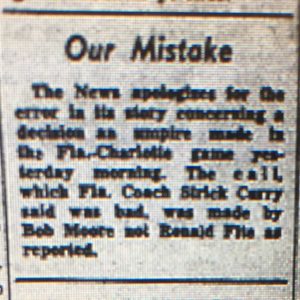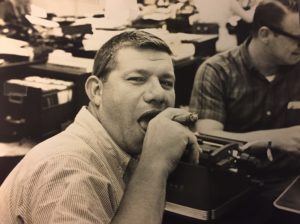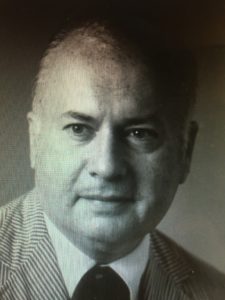During the late 1960’s, when I worked for The Charlotte News, I thought seriously about leaving the craft for a higher paying job. Comparatively speaking I was well paid, but it just wasn’t enough. My wife, Donna, and I had three children, we were buying a new house and car and I had to work three nights a week and all day Saturday at a second job to make ends meet.
Once I actually accepted a job covering news for WAYS radio, and then backed out when The News made me a good counter offer.
I interviewed for a job as sports information director at Davidson College. I had worked three years in UNC’s sports information office when I was a student there and I thought I was well qualified. But I didn’t like them very much and, apparently, they didn’t didn’t like me either. Davidson did not offer me the job.
And once I went to lunch with a flack for Duke Power Co. who was trying to recruit me to work in “public relations” at Duke. I finally came to my senses and told him, “No, thank you.”
But lunch was interesting.
The Duke fellow took me to a Chinese place. He was a former sports writer for The Charlotte Observer so conversation was easy, we had a lot in common.
 The food was excellent and so was the service. At one point, the owner came by to say hello to the Duke Power man. It was pretty obvious that he was a regular and that the two men were friends.
The food was excellent and so was the service. At one point, the owner came by to say hello to the Duke Power man. It was pretty obvious that he was a regular and that the two men were friends.
When it came time to pay the bill the owner would not allow my host to pay. He held his hands up, palms out, as if he was going to push him away. No, no, he said.
When we got in the Duke Power man’s car and he headed back to my newspaper, to take me back to work, I asked why, why had the owner refused payment?
This is what the Duke guy told me:
The restaurant owner liked to gamble and my host, who has been a sports writer remember, was able to give him a leg up, a big advantage.
[You do know, of course, that this happened long before the Internet and the age of instantaneous information.]
The restaurant owner would call The Charlotte Observer’s sports department and ask my host for the scores of baseball games that had just started, looking for a game that wasn’t on the radio where one of the teams had taken a big lead in the first inning. Inning by inning results of all the games came in on the sports department’s teletype machine so that information was readily available to sports writers.
When the restaurant owner found a game where the score was already lopsided he would place a bet on the team with the big lead.
Several years had passed but restaurant guy still remembered those money making favors fondly and told the former sports writer, in effect, “Lunch is on me.”
Coming Friday: The Best Answer


